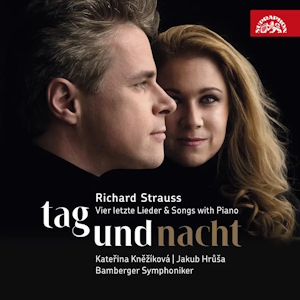
Richard Strauss (1864-1949)
Tag und nacht
Kateřina Kněžíková (soprano)
Bamberger Symphoniker/Jakub Hrůša (piano)
rec. 2021/24, Dvořák Hall of the Rudolfinum, Prague
Supraphon SU4346-2 [56]
Strauss’s love for the soprano voice is known by all who know his music, and many are the sopranos who have queued up to sing his operas and songs because they know the composer can show them at their very best. Discs of Strauss’s lieder for both piano and orchestral accompaniment aren’t that common, so Kateřina Kněžíková’s disc commands attention for that alone. It’s a fine disc in many ways, but it’s also somewhat unremarkable, and once you consider the competition it seems unlikely that it will gain much traction beyond her established fans.
The songs with piano accompaniment come first, and they establish the fact the voice’s central qualities, namely its attractive brightness. At first it feels a little “neutral”: you won’t hear Soile Isokosi’s ripeness, nor Jessye Norman’s richness, and certainly not Elisabeth Schwarzkopf’s way with the German language. However, before you’ve spent much time with the voice you realise it’s more attractive than just neutral: it’s bright and clean, and in songs like Ständchen it incorporates the verses’ sense of joyous naïveté, staying on just the right side of being coy. Likewise, in Cäcilie it takes us on a clear upward journey, and Das Rosenband leads clearly and satisfactorily up to the final word, “Elysium”. Morgen, one of Strauss’s finest and most popular songs, is full of straightforward beauty, the voice not trying to be anything in particular, but just letting the song work its intrinsic magic which, for most Strauss lovers, will be enough.
Reservations set in elsewhere, though, particularly when you consider the quality of the competition. Lovely as Cäcilie is, it doesn’t climax with quite as much confidence as you’ll hear elsewhere, and the speedy vocal quavers at the opening of Ich wollt ein Sträusslein binden are unfocused and woolly. Faster songs like Muttertändelei also sound squally on the runs, and bring home the fact that Kněžíková isn’t as comfortable with the German language as her rivals.
The game ups considerably with the Vier Letzte Lieder. It feels like there’s more confidence here, perhaps because they were recorded nearly three years previously. The voice feels more relaxed and comfortable, though really the laurels go to the Bamberg Symphony Orchestra, which sounds great with the subtle flickerings at the start of September, and the gentle expansiveness of Im Abendrot makes it the most successful song. Conductor Jakub Hrůša really gets the final bars, which sound completely gorgeous as they relax into the empyrean, though he drops the ball somewhat clumsily in the closing bars of September, which sound rather peremptory with no sense of leading up to the big horn solo.
He’s perhaps finer as a pianist, because he brings the effects to life effectively when he needs to, such as the beautiful rustling of Ständchen. However, much of the time he simply sets the tone and then gets out of the way, such as in the opening bars Allerseelen, and he ekes out gorgeously every beauteous phrase of Morgen.
So this is an enjoyable disc, but it rather pales in comparison with the long-established Strauss discs and what is, for me, the finest of recent years: Soile Isokoski’s 2011 recital with piano.
Simon Thompson
p>Buying this recording via a link below generates revenue for MWI, which helps the site remain free


Contents
Songs with piano:
Zueignung, Op. 10/1
Die Nacht, Op. 10/3
Allerseelen, Op. 10/8
Ständchen, Op. 17/2
Cäcilie, Op. 27/2
Heimliche Aufforderung, Op. 27/3
Morgen, Op. 27/4
Das Rosenband, Op. 36/1
Muttertändelei, Op. 43/,
Winterweihe, Op. 48/4
Waldseligkeit, Op. 49/1
Ich wollt ein Sträusslein binden, Op. 68/2
Das Bächlein, Op. 88/1.
Vier letzte Lieder for soprano and orchestra
















